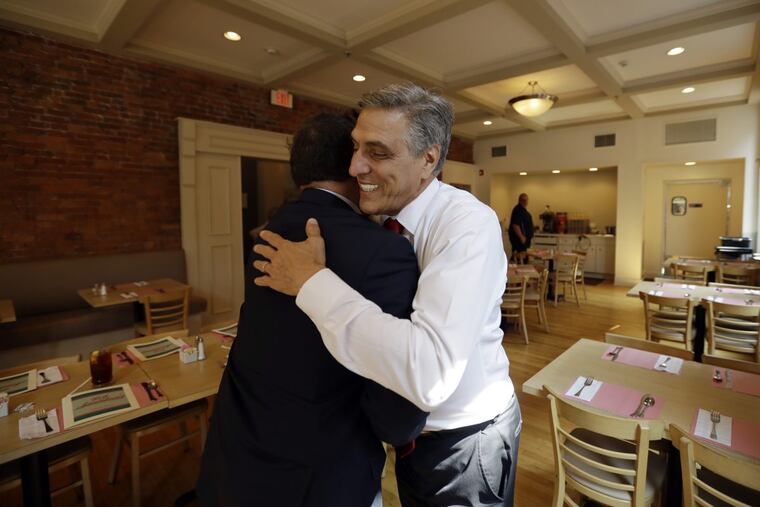Lou Barletta wins Republican U.S. Senate primary
U.S. Rep. Lou Barletta of Hazelton, a President Trump ally, wins Republican nomination for U.S. Senate in Pennsylvania.

HAZLETON, Pa. — Trump loyalists propelled one of their own onto the U.S. Senate ballot Tuesday, but Lou Barletta is going to need more than that reliable constituency to win in November in a state where the president's approval rating is hovering around 40 percent.
He hitched his political wagon to President Trump's three years ago and there's no turning back now, not that he would. Barletta is among his first and staunchest supporters.
The four-term congressman from Hazleton handily defeated State Rep. Jim Christiana of Beaver in the Republican primary. Now he'll face incumbent Democrat Bob Casey.
He celebrated his win with friends and supporters who packed into the Pines Eatery for snacks, drinks, and camaraderie.
His victory surprised no one, least of all Barletta, who wasted little energy campaigning against Christiana. Launched on Sunday, his first televised campaign ad attacked Casey, not Christiana.
Barletta raised almost $3 million to Christiana's $274,000 but spent little of it on the primary, which he appeared to view as a small hurdle on the track toward November.
Christiana, 34, who spent the last decade as a state representative, won large portions of the western part of the state, but not enough to beat Barletta, who carried the central and eastern parts, where the former Hazleton mayor is well-known.
"Barletta is going to try to make this race about Casey, and Casey is going to try to make it about Trump. If the president's numbers stay where they are now, he's going to be a real drag on … Barletta, but if the president has a successful year and his numbers rebound, Barletta could win this race," said Chris Borick, a pollster and political scientist at Muhlenberg College.
Short of that, Casey is in good shape to hold onto his seat, Borick said.
Expect Barletta to try to tie Casey to Senate liberals like Democratic Leader Chuck Schumer, whose policies are too far left for many Pennsylvania moderates. He won't be able to rely on the same strategies that Trump used to carry the state in 2016 because Casey can't be demonized the way Hillary Clinton was.
Casey campaign manager M.E. Smith framed the match-up as "a choice between a candidate who fights for working families and a candidate who fights for the corporate interests that stack the deck against them. … It will be a choice between a candidate who stands up to President Trump when he's wrong and a candidate who believes President Trump can do no wrong."
Barletta and Republicans like him across the country are taking a different tack than Democrats did in 2014 when, aware that the president's party tends to lose seats in midterms, they distanced themselves from Barack Obama.
That hasn't happened in this race, where Trump recorded a campaign robocall over the weekend for Barletta. "There is zero distance" between the president and the congressman, Borick said. "He has in many ways become the proxy for President Trump."
That makes Tuesday's primary a harbinger for other Trump-aligned candidates across the country.
"Trump has not been particularly successful in translating his own popularity with his base to voters from that base for other candidates," said University of Pittsburgh political scientist Kristin Kanthak. She pointed to the losses of special election candidates Rick Saccone in Pennsylvania and Luther Strange in Alabama.